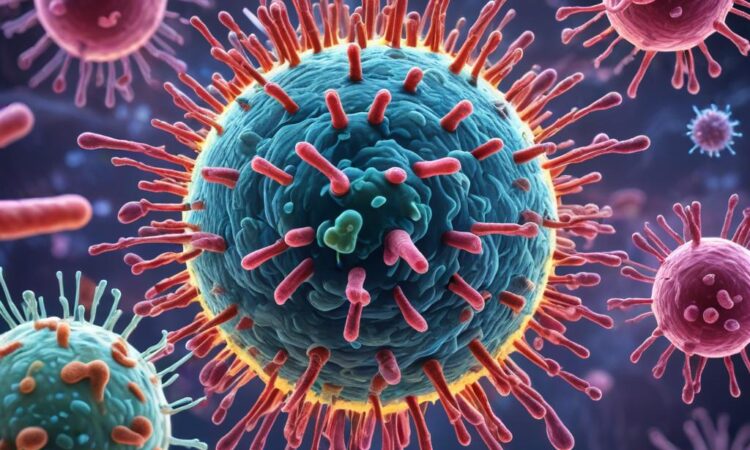Antimicrobial Resistance (AMR) Crisis: A Growing Threat
The world faces a looming crisis: the rise of antimicrobial resistance (AMR). Drug-resistant infections are becoming increasingly common, threatening the effectiveness of antibiotics and other antimicrobial agents that are crucial for treating a wide range of bacterial, viral, parasitic, and fungal infections. This poses a significant threat to global health security and sustainable development, jeopardizing progress made in healthcare and impacting various sectors of society.
The Scope of the Problem
The scale of the AMR crisis is staggering. According to the World Health Organization (WHO), antimicrobial resistance is one of the biggest threats to global health, food security, and development today. Every year, millions of people worldwide are affected by drug-resistant infections, leading to prolonged illness, increased healthcare costs, and significant mortality. The problem is not confined to specific regions; it is a global challenge affecting both high-income and low-income countries alike.
The rise of AMR is largely attributed to the overuse and misuse of antimicrobial agents. In many settings, antibiotics are prescribed inappropriately, often for viral infections where they are ineffective. The widespread use of antibiotics in agriculture, particularly in livestock farming, also contributes significantly to the development and spread of resistant bacteria. Furthermore, inadequate infection control practices in healthcare facilities can facilitate the transmission of resistant organisms.
The Impact of Drug-Resistant Infections
The consequences of AMR are far-reaching. Infections that were once easily treatable with antibiotics can become life-threatening, requiring more intensive and expensive treatment. Surgical procedures and other medical interventions become riskier, as the risk of post-operative infections increases. The increased length of hospital stays and the need for more sophisticated treatment options place a heavy burden on healthcare systems worldwide.
Beyond the immediate health impacts, AMR has significant economic implications. Increased healthcare costs, loss of productivity due to illness, and the potential for disruptions to various sectors of the economy highlight the considerable financial burden imposed by this crisis. The social consequences are also profound, impacting individuals, families, and communities through illness, death, and economic hardship.
Addressing the AMR Crisis: A Multifaceted Approach
Combating AMR requires a comprehensive and multi-sectoral approach. Effective strategies need to address the various factors contributing to the problem. Key interventions include:
1. Improved Infection Control Practices
Strict adherence to infection prevention and control measures in healthcare settings is crucial. This includes proper hand hygiene, appropriate use of personal protective equipment, and effective environmental cleaning and disinfection. Implementing robust surveillance systems to track the spread of resistant organisms is equally important.
2. Antibiotic Stewardship Programs
Implementing effective antibiotic stewardship programs is essential to optimize antibiotic use and minimize the development of resistance. These programs involve educating healthcare professionals on appropriate antibiotic prescribing practices, promoting the use of diagnostic tests to guide treatment decisions, and ensuring the judicious use of antibiotics in both human and animal health.
3. Development of New Antimicrobial Agents
Research and development efforts are crucial for the discovery and development of new antimicrobial agents with novel mechanisms of action. This will provide alternative treatment options for drug-resistant infections. Incentivizing pharmaceutical companies to invest in this area is paramount.
4. Strengthening Surveillance and Data Collection
Comprehensive surveillance systems are needed to monitor the prevalence of drug-resistant infections and track the emergence of new resistance mechanisms. This data is vital for informing public health policies and guiding intervention strategies.
5. Public Awareness and Education
Raising public awareness about the dangers of AMR is crucial. Educating the public about the importance of appropriate antibiotic use, proper hygiene practices, and the need to complete prescribed courses of antibiotics is vital in preventing the further spread of resistance.
6. Collaboration and Coordination
Addressing the AMR crisis requires strong collaboration and coordination among various stakeholders, including healthcare professionals, researchers, policymakers, pharmaceutical companies, and the public. International cooperation is also essential to share best practices and coordinate efforts globally.
Specific Examples of Drug-Resistant Bacteria
Several specific bacteria have gained notoriety due to their increasing resistance to antibiotics. Examples include:
- Methicillin-resistant Staphylococcus aureus (MRSA): A bacterium responsible for a range of infections, from skin infections to life-threatening bloodstream infections. Its resistance to many commonly used antibiotics makes it a significant challenge to treat.
- Carbapenem-resistant Enterobacteriaceae (CRE): A group of bacteria that are resistant to many types of antibiotics, including carbapenems, which are often used as a last resort. CRE infections can be extremely difficult to treat and are associated with high mortality rates.
- Multidrug-resistant tuberculosis (MDR-TB): Tuberculosis is a serious infectious disease caused by bacteria that infect the lungs. MDR-TB strains are resistant to several first-line anti-tuberculosis drugs, requiring longer and more complex treatment regimens.
These are just a few examples of the many drug-resistant bacteria that pose a threat to global health. The emergence and spread of these resistant organisms highlight the urgency of the AMR crisis and the need for immediate and concerted action.
The battle against AMR is a global effort requiring sustained commitment from all stakeholders. Only through a combination of improved infection control practices, responsible antibiotic use, the development of new antimicrobial agents, and increased public awareness can we hope to mitigate the devastating effects of this growing crisis. Failure to address AMR effectively will have profound and lasting consequences on global health and well-being.
Further research is continually being conducted to understand the mechanisms of resistance, identify new drug targets, and develop innovative therapeutic strategies. International collaborations and data-sharing initiatives are crucial for accelerating progress in this area. The development of rapid diagnostic tests to quickly identify drug-resistant pathogens is also critical for guiding appropriate treatment decisions and preventing further spread.
In conclusion, the antimicrobial resistance crisis demands immediate and concerted action. It requires a collective effort from individuals, healthcare systems, governments, and international organizations to implement effective strategies to combat this growing threat to global health. Failure to act decisively will result in a future where many common infections become untreatable, leading to increased morbidity, mortality, and enormous economic burdens.

